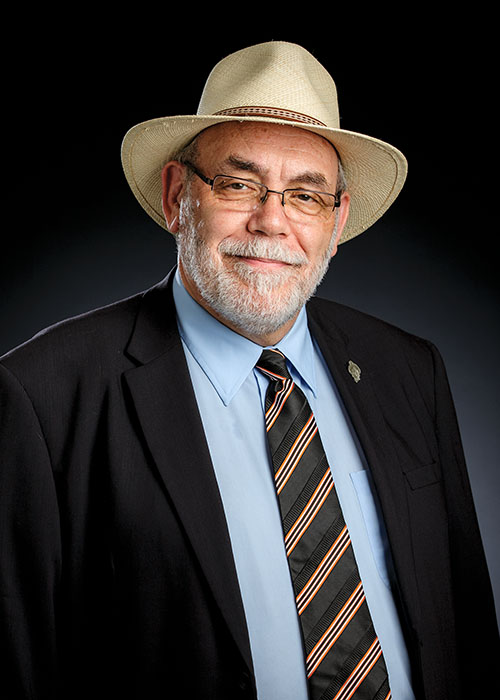
'Cool and Different'
Thursday, August 29, 2019
Honors College takes research and 'rabbit holes' to the highest academic standards, says Dean Garbutt
For the first time in its history, the Honors College had two hooding ceremonies this spring to accommodate its 135 graduates and their families. Students with this award have completed all the Honors College degree requirements with a minimum grade point average of 3.5.
Another 67 students were recognized for having received or being candidates for a General Honors Award or a Departmental or College Honors Award for the previous academic year.
When Dr. Keith Garbutt arrived in 2014, he became the first dean of the Honors College.
“Honors dean is such a great position to have,” Garbutt said in his distinct British accent. “I’m working with smart undergrads. All deans have to deal with problems, but the problems that walk through my door are good ones. It’s ‘Wow, that’s a cool idea, how could we do that?’ Those are the best sort of problems to have.”
The Honors College Degree is the highest academic distinction OSU awards.
The program serves roughly 2,100 students from a wide range of majors across all colleges.
Honors students are routinely selected as Top 10 Freshmen, Outstanding Seniors and regularly nominated for — and win — national awards, such as Truman and Goldwater scholarships.
“We are going to expect a lot of you but also be there to help through honors advising and supportive professors,” said Dr. Robert Spurrier Jr., director emeritus of the Honors College and professor emeritus of political science.
Spurrier, who taught at OSU from 1972 to 2014, was instrumental in getting the Honors College moved from the fifth floor of Edmon Low Library to Old Central.
“It is wonderful the Honors College is housed there,” Spurrier said. “It is a classic space.”
He will teach First Amendment freedoms, along with honors law and legal institutions, this fall.
“We’ve prided ourselves in having some of the most rigorous standards with the numbers of credit hours for the Honors College degree and the GPA required,” Spurrier said.
To earn an Honors College degree, a student must complete at least 36 honors credit hours and six hours of thesis work.
“That makes us one of the most rigorous programs in the country,” Garbutt said. “Doing research is a crucial part of the experience. Our program, like most of the programs in the country, integrate Honors into the curriculum of the university.”
Honors courses are often general education classes because all students have to take those.
“We’ll take History 1113 and do an honors section of it, and do something completely different with it but still meet the history requirement,” Garbutt said. “In a traditional class, you are kind of restrained by all the material you have to get through. In an Honors class, if the class disappears down a really interesting rabbit hole, you can go after them and see what’s down there and what’s cool and different.”
The Honors College also encourages students to have educational experiences outside the traditional classroom, such as studying abroad.
“Doing short-term study abroad is OK, but you tend to carry a little bubble of American around with you if you’re not careful,” Garbutt said. “I’d really like to see a lot more students do it. The appreciation of where you come from changes once you’ve been abroad. You see that some things you just take for granted are really important and some things you thought were important now seem strange and you wonder why you are doing them.”
Professors can also have a big impact on student success.
“The thing that defines an Honors professor is their passion for what they are teaching,”
Garbutt said. “They are all volunteers and want
to experiment, trying stuff out to see what might and might not work. Professors are
engaged, and students are part of the learning process. Under those sorts of circumstances,
you can take students on an intellectual journey they didn’t think they could do.”
| Well Content |
|---|
|
OVER THE YEARS 1963 — Dr. Eugene Swearingen announces the start of an honors program within the Business College. 1964 — Dr. Robert Kamm promotes the Arts and Sciences honors program to freshmen and sophomores. 1969 — First three students graduate with honors degrees. 1989 — The individual honors programs are consolidated to form the universitywide OSU Honors Program. 2000 — The OSU Honors Program is recognized as an independent academic college and becomes the Honors College. 2009 — The Honors College gets a new home in Old Central. 2019 — The Honors College graduates the largest number of degree recipients since its inception. |
